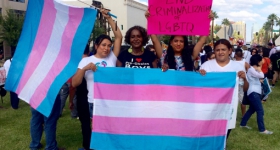My first identity was Vietnamese American, in the awkward way that only a kid who grew up around other Vietnamese American kids could be. I loved--and still love--Little Saigon in Orange County, but there was something suffocating about growing up around other Vietnamese Americans who had varying levels of cultural involvement, such as Vietnamese school on Saturdays; lion dance clubs; the Vietnamese equivalent of the Boy Scouts, and others had monthly parties with their large, extended families.
I had none of those experiences. I had my mom, my stepdad’s relatives, and myself. My mom had few friends. We were isolated, like islands, but across the horizon I could always hear and see what other Vietnamese families did or didn’t do. In comparison, I never felt “Vietnamese” enough. My classmates described me as whitewashed or uncultured, no matter how well I spoke Vietnamese. For me, my Vietnamese identity overshadowed my gender identity, just because I was always striving to be more Vietnamese, whatever that meant.
My gender was a critical factor to my mom. Many of her life choices had been influenced by gender. She had three biological children, but I was the only one she could call her con gái. Her daughter. My mom ran away from her abusive first marriage, but she didn’t feel guilty for leaving her sons behind. They were con trai--boys--who would grow up into men. She felt they didn’t need her, but her con gái needed her the most. She could never leave me behind.
The country she had left behind was about her culture, as much as it was about gender.
When I was in fourth grade, my parents’ divorce left our family wrecked. For a year, I lived with my great aunt in Las Vegas in relative independence. When I returned to California to live with my mom and her new husband, everything was too different. I thought my mom was too overbearing, and we fought nearly everyday. We never fought about anything big, but would clash for hours: my mom would come home from a ten hour shift at work to find that I had accidentally broken a plate or bowl through carelessness, and it would blow up in our tiny one-room house.
Looking back, I never really understood when I realized that I wasn’t necessarily straight. What I do remember is telling a friend, “My dream when I grow up is to have a girlfriend, own a leather jacket, ride a motorcycle, and be a man.”
Logically, my friend replied, “You don’t have to be a man to have those things.” I agreed, but my dream didn’t feel right without that last part. However you looked at it, it seemed like a silly dream, and I shrugged it off.
After all, the fights with my mom had grown more and more violent and angry, especially when my mom was unemployed. I came to the conclusion we would never understand each other. I had no doubt that I loved her, but it would never be enough to bridge the emotional gap between us. I vowed never to come out to her. She didn't need to know about my gender or sexuality. What did those matter when she had so many more pressing things to worry about and telling her would only stress her out? Our relationship--or lack thereof--seemed to eclipse the identity issues I had.
I decided to make my mom happy: live a "normal" life, graduate high school, go to college, and find the job I loved. I decided to pursue all things she had never had a chance to have. If I had to live in the metaphorical closet for the rest of my life, so be it.
As an undergraduate at UCLA, I brought my girlfriend to my mom’s house for a couple of days with the pretense of taking a foreign friend to Los Angeles for her first time. My mom treated her with kindness, like her own daughter. It was strange, but I felt relieved that I didn’t have to explain anything to my mom.
That summer, while I was on the computer, my mom sat down on my bed and asked me, “Con có muốn làm thành con trai không?” Do you want to become a boy?
She didn’t ask, “con có thích con gái không?" Do you like girls? She didn’t ask...
I was stunned. I didn’t know what to say. Most parents would have jumped to the conclusion that their children might be gay. Never once did I hear of a parent who asked if their child wanted to be a different gender.
I still tried to deflect. I didn’t want to have this conversation now. I didn’t ever want to have this conversation, not when I didn’t have the words to talk about the subject. My Vietnamese was “good” by Vietnamese American standards, but would never hold up in a conversation about my identity.
My mom persisted. “Nếu con muốn thành con trai, thì không sao. Mẹ sẽ lúc nào thương con." If you want to become a boy, it’s okay. I’ll always love you.
I didn’t want to reconsider telling her, but I was shocked by what she was saying. She was offering me a way out of the closet with the promise that it wouldn’t be a one-way trip out of the house. I thought to myself, I’m lucky, I should tell her.
I never said the word “transgender.” That word meant nothing to her, and even if I told her, it would come with the connotations my mom didn’t understand: American. White. Not my child.
So I told my mom the truth that day--or as close to the truth as I could. I told her: I wanted to be a man. I wanted to be her son, but whatever I was, I was still her child. Con cũng là con cửa mẹ.
My mom cried.
From the way she described it, it was not my fault, but hers. She was the one who was a bad mother, who had done something wrong. Somewhere out there, Buddha was punishing her. Her daughter turning out to be a man was karmic retribution for all the wrong she had done. It was like she didn’t know me anymore, and she could barely look at me.
I was heartbroken, but more than that, I was angry. I was angry at her for asking, for forcing me to come out. I was angry. I was angry I couldn’t hold onto this secret for the rest of my life, out of view from her eyes. I was angry that she had made me hurt her. I wanted her to be happy, so why did she have to shine a spotlight on all the ways in which I wasn’t her ideal, perfect daughter?
After she stopped crying, she finally responded “we won’t talk about it ever again. I told you, you’ll always be my daughter, but don’t tell anyone. Don’t tell me again.”
At first we pretended like it never happened, but throughout college, she made comments here and there, especially after I was able to move out and live closer to the campus, instead of commuting from Orange County to UCLA.
The freedom allowed me to buy binders, cut my hair more often, and introduce myself as Tony rather than the name my mom had given. All these little changes prompted the soft-spoken suggestions, like “You should try wearing this accessory” or the question of “why I had to cut my hair so short”.
Each time, each question, I delivered the painful news again: “I wear men’s shirts because I’m a boy. I cut my hair short because I’m a boy.” The news was always met with silence, and through the phone, forty miles away, I could hear her heart breaking.
Even though we couldn’t explicitly talk about gender, our relationship improved--slowly. My being at school created distance and the distance helped. We had space from each other, and I learned to miss her when she wasn’t around.
Over the course of the last two years, my mom was finally able to understand my aloofness as a teenager. Although we never spoke about my gender identity, we were able to turn our attention to other subjects, such as my education or our financial situation.
Six months after I came out to my mom, she took me to a clothing outlet on my request. Normally, she would pick out clothes from the women's section.
That day my mom went straight to the men's section, picked up a men's shirt, and said, "This is a nice shirt. Why don't you try it on?"

One of the many, many men’s shirts my mom would eventually end up buying me. I’m sure there are more to come.
When my girlfriend and I broke up two years after I came out as transgender, I confided in my mom about my romantic struggles. She said, “Don’t worry. When you get your degree, you can wave it around and girls will come running.” She gave me men’s shirts my step-dad wouldn’t wear. She looked at men’s jeans with me.
What she said and did--what she says and does now--are little things. We never talked about it. What was there to talk about? My mom had, in her own way, come to accept that my identity was what it was.
There’s no easy solution, no easy ending. Even now, my mother still calls me her only daughter, but I’ve come to take pride in her statement, too, in the same way she takes pride in me.
My pride is hard to explain. After all, in English, the word, "daughter" has gender and familial relationships tied up together intimately. But in Vietnamese, it’s different. In Vietnamese, I am my mother's con gái--literally child who is a girl. My mother's child, first, always.
When I introduce myself, I rarely say that I’m transgender. But I do say, I’m Tony, second generation Vietnamese American man born of immigrants, người Mỹ góc Việt, American rooted in Vietnam, to remember where I’ve come from. Most of all, I say it to remember my mother, who always has a space for me in her heart, even as I stumble through languages that have no space for me.
***
Tony Tonnu is a transgender 2nd generation Vietnamese American guy from Orange County, currently living in Los Angeles. He graduated from UCLA, class of 2014, with a Bachelor's in American Literature and Culture and Asian American Studies and was the former Assistant Director of Internal Affairs, Publicity and Outreach Coordinator, and intern for Asian Pacific Coalition at UCLA. He also wrote briefly for Pacific Ties, the Asian American Studies newspaper at UCLA.
In other spaces, Tony is a tech geek who worked in IT, specializing in hardware and networking. He was an Angry Reader of the Week once on Angry Asian Man, but otherwise he has nothing much going on except desperately looking for the correct diacritics when typing in Vietnamese.









Comments